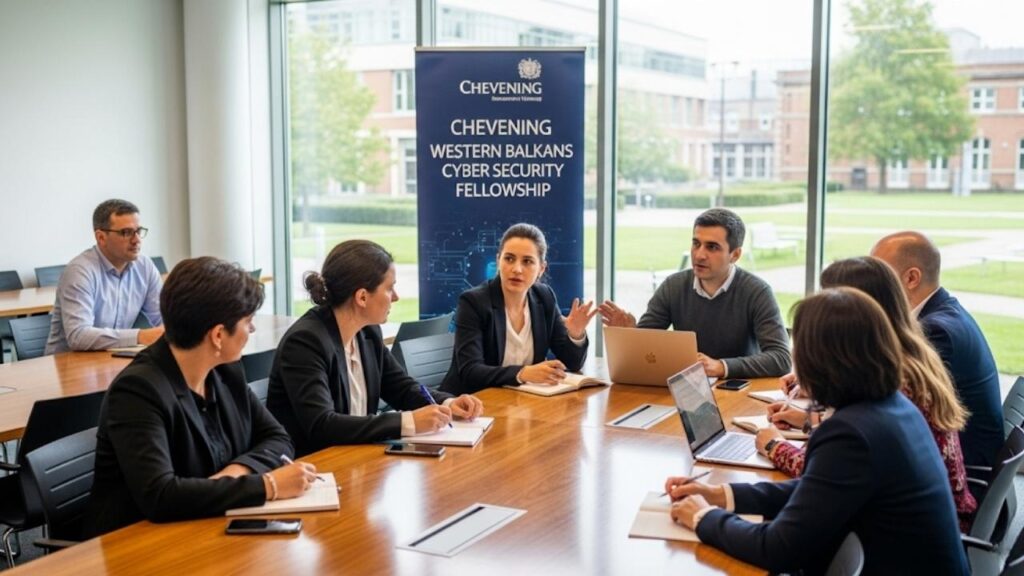The digital world is evolving at a lightning-fast pace, bringing with it new opportunities and new threats. For a region as dynamic as the Western Balkans, a strong, secure digital future is not just a luxury—it’s a necessity. If you’re a mid-career professional passionate about shaping this future, the Chevening Western Balkans Cyber Security Fellowship 2025 is your gateway to a transformative experience. This isn’t just about learning technical skills; it’s about joining a network of leaders and policy-shapers committed to building a safer digital world. We’ll walk you through everything you need to know, from eligibility to application tips, to help you seize this life-changing opportunity.

The Chevening Western Balkans Cyber Security Fellowship 2025 is more than just a course—it’s a call to action. It’s an invitation to become part of a solution, to lead the charge in protecting your country’s digital infrastructure and building a resilient society. The application process is challenging, but every step is a valuable exercise in self-reflection and professional development. Don’t let the fear of a blank page hold you back. Start your research, reach out to former fellows, and begin crafting a story that shows why you are the leader your country needs. Your digital future—and the future of the Western Balkans—is waiting for you to shape it.
What is the Chevening Western Balkans Cyber Security Fellowship?
The Chevening Western Balkans Cyber Security Fellowship is a fully funded, 10-week professional development program delivered by the prestigious Cranfield University at the Defence Academy of the United Kingdom. Funded by the UK’s Foreign, Commonwealth & Development Office (FCDO), the fellowship is designed for mid-career professionals from Albania, Bosnia and Herzegovina, Kosovo, North Macedonia, Montenegro, and Serbia. The core objective is to provide fellows with a deep understanding of cyber policy and legislative approaches, and their wider implications for national security, economic opportunity, and privacy.
This isn’t your average training course. It’s an immersive program that combines academic instruction with real-world exposure, providing a holistic perspective on the cyber threat landscape. I’ve seen many successful applicants leverage this fellowship to pivot their careers, moving from technical roles into influential policy or leadership positions, equipped with a comprehensive understanding of how technology and governance intersect. The fellowship focuses on three key areas:
- Cyber Threats: You’ll dive into the evolving threat landscape, learn about risk assessment, and explore the protection of critical national infrastructure.
- The Economics of Online Business: This module covers topics like consumer awareness, technology adoption challenges, and the role of open source in a digital economy.
- Cyber-crime and Internet Law: The program tackles the economic impact of cyber-crime, domestic and international legal frameworks, and the complex issues of privacy and accountability in cyberspace.
Am I Eligible? Key Chevening Fellowship Requirements
Before you get started, it’s crucial to confirm your eligibility. The Chevening fellowship has specific criteria designed to identify candidates with the highest potential for impact. You must:
- Be a citizen and resident of one of the eligible Western Balkan countries: Albania, Bosnia and Herzegovina, Kosovo, North Macedonia, Montenegro, or Serbia.
- Be a mid-career professional. This means you need a minimum of five years of relevant work experience by the time you apply. This experience can be in cyber security, cyber policy, or a related field, whether as a policy maker, academic, or commentator.
- Hold a postgraduate-level qualification or have equivalent professional experience at the time of your application.
- Be committed to returning to your country of citizenship at the end of the fellowship. This is a core part of the Chevening commitment to building capacity and fostering change within your home country.
- Demonstrate a good working knowledge of English. Your proficiency will be assessed through your application and, if you’re shortlisted, during an interview.
It’s important to note that you cannot hold dual British citizenship, nor can you be a current or recent employee of His Majesty’s Government or a relative of such an employee within the last two years from the application opening date. For a complete list of eligibility criteria, always consult the official Chevening website before applying.
Navigating the Application Process: A Step-by-Step Guide
The application for the Chevening Western Balkans Cyber Security Fellowship 2025 is a detailed process that requires careful thought and preparation. Applications open in August and typically close in early October, so you’ll want to start gathering your materials well in advance.
1. The Online Application Form
Your journey begins on the official Chevening application portal. This is where you’ll provide your personal details, academic history, and a detailed record of your work experience. Be meticulous and ensure all information is accurate and consistent with your supporting documents. This initial step is your first impression, so make it count.
2. Crafting Your Essays: The Heart of Your Application
The essay questions are where you can truly shine. Chevening uses a competency-based approach, so your answers should provide concrete examples from your professional life. The questions will likely center on your leadership potential, networking skills, and how you plan to use the fellowship to create a positive impact in your country.

- Leadership and Influence: Don’t just list your accomplishments. Tell a story about a time you led a project or team, and what you learned. Show how you’ve influenced others or driven a change in your workplace or community.
- Networking: Chevening is all about building a global network. Explain how you’ve built professional relationships in the past and, more importantly, how you plan to use the Chevening network to achieve your goals.
- Career Plan: This is your chance to connect the dots. Articulate how the fellowship fits into your long-term career goals and how the knowledge you gain will help you address a specific cyber security challenge in the Western Balkans.
In my experience advising students, one common hurdle is moving beyond a generic summary of their CV. The key is to be specific. Instead of saying “I improved cyber security,” state, “I developed and implemented a new policy framework that reduced a specific type of cyber-attack by 30%.” Numbers and concrete outcomes are powerful.
3. Securing Your References
You’ll need to provide two referees who can speak to your professional and personal qualities. These should be people who know you well and can provide specific examples of your leadership potential and other skills. Make sure to contact your referees early in the process and give them clear instructions on what you need.
Beyond the Application: What Happens Next?
If your application is successful, you’ll be shortlisted for an interview, typically held in early spring. This interview is a crucial final step. It’s a chance to expand on the stories you told in your essays and demonstrate your passion and commitment in person.
Following a successful interview, you’ll be notified of your selection. This is a moment of immense pride and excitement! The Chevening team will then guide you through the next steps, including visa applications and preparing for your departure to the UK.
Why the Chevening Western Balkans Cyber Security Fellowship?
So, why go through all this for 10 weeks? Because the impact is immeasurable. The program’s value extends far beyond the curriculum.
- A World-Class Education: You’ll study at Cranfield University, a globally respected institution known for its expertise in defense, security, and technology.
- Unparalleled Networking: You’ll connect with fellow professionals from across the Western Balkans and join a global network of over 55,000 Chevening alumni—a powerful community of leaders, innovators, and policy-shapers.
- Real-World Application: The fellowship is designed to equip you with the knowledge and tools to drive real change in your home country. Fellows like Valdet Shehu from Kosovo have used their experience to develop new cyber security platforms for their governments, while others have improved legal frameworks for fighting cyber-crime (Chevening, 2025).

A Guide to Securing the Ernst Ludwig Ehrlich Doctoral Scholarship 2026
A Comprehensive Guide to the Heinrich Böll Foundation Scholarship for 2026 Spring Admissions
FAQs
Q1:What is the deadline to apply for the Chevening Western Balkans Cyber Security Fellowship 2025?
The application deadline is October 7, 2025, at 12:00 UTC. It’s crucial to submit your application well before this time to avoid any last-minute technical issues.
Q2:Is the Chevening Western Balkans Cyber Security Fellowship fully funded?
Yes, the fellowship is fully funded. It covers all program fees, living expenses for the duration of the fellowship, and a return economy airfare from your home country to the UK (Chevening, 2025).
Q3:Do I need a technical background to apply?
No, a purely technical background is not required. The fellowship is designed for mid-career professionals in the broader fields of cyber security and cyber policy. As long as you can demonstrate relevant work experience and leadership potential in these areas, you are encouraged to apply.










